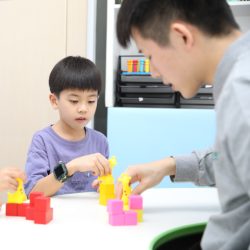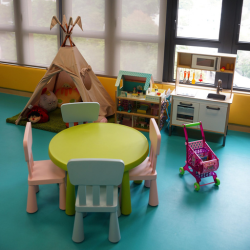In the rapidly evolving landscape of education, one fundamental truth remains unchanged – the wellbeing of each child is profoundly shaped by the interconnected triangular relationship that exists between the child, their parents and the school. As schools across the globe continue to become more conscious of increasing societal threats to the wellbeing of young people, they seek to ensure every child within their care flourishes, by proactively nurturing their holistic development.
This need has become more crucial than ever for AISL Harrow schools – to prioritise the act of engaging parents as truly active ‘care-collaborators’. By forging a strong school-home connection, we understand that our educators can empower parents to become valuable allies in promoting the positive wellbeing of their children, throughout all phases of the school journey.
Putting Parents Centre Stage
A child’s wellbeing is multifaceted; it encompasses their physical, emotional, social, and academic needs. While schools undeniably play a central role in addressing these domains and may consider themselves generally as an expert, parents possess a unique understanding of their own child’s individual strengths, challenges, traits and characteristics.
By seamlessly integrating this parental insight, schools can create a more comprehensive and personalised approach to each student’s wellbeing. Parents, ultimately, have the deepest insights when it comes to their child’s needs. They have observed their child’s behaviour from birth and can therefore provide the most valuable advice on what may be required in order for their child to truly thrive.
Promoting a strongly collaborative approach with parents within each AISL Harrow school not only benefits the students, but it also strengthens each school’s overall sense of community. When parents feel their voices are heard and their contributions valued, they are more likely to actively engage with the school, fostering a wider sense of shared responsibility for promoting success for all children.
Strategies for Effective Parent Engagement
Recognising the pivotal role of parents, AISL Harrow schools continuously devise and explore strategies to cultivate meaningful partnerships that will empower families in supporting student wellbeing.
- Generating a Culture of Open Communication Channels
Establishing clear and consistent communication channels is the foundation for effective parent engagement. Schools utilise a variety of channels, from regular electronic updates via chosen platforms, the use of social media, secure portals and of course a multitude of formal and less formal in-person face to face opportunities. When properly strategised, each can provide a vital piece of an overall jigsaw of interconnectedness which ensures that parents feel well included, informed, heard and empowered. This, in turn, builds trust, understanding and a comfort with sharing information and learning how to support wellbeing. - Parent Collaboration Opportunities
Involving parents in the wellbeing provision of our schools demonstrates a genuine commitment to their input and a willingness to incorporate their perspectives. Schools often invite parents to participate in the likes of wellbeing committees, to contribute to the development of key pastoral policies, and to provide feedback and insights on the effectiveness of existing programmes and initiatives.
This ensures the school’s provision remains relevant, properly targeted, well-understood, collaborative and aligned with the child’s experiences of both school and home. Research indicates that students of parents who are more directly involved in school-parent collaboration demonstrate higher levels of self-esteem, enjoy school life more, perceive school as a more satisfying experience, and have improved academic outcomes.AISL Harrow schools offer various educational workshops and resources, covering topics such as mental health, conflict resolution, stress management, and positive parenting strategies. Involving the students themselves in the planning and delivery of such parent education programmes ensures that topics are genuinely relevant, and that strategies are appropriately targeted.
Schools often find they have a rich resource of wellbeing expertise within the parent body as parents carry this expertise through professional knowledge and/or their own parenting experience. This can provide an added dimension of understanding for other parents, students and school staff.
Such a forum can be especially impactful as students’ progress through the more senior years of schooling when, typically, openness of communication between parents and their child may lessen. Such approaches create a deeply embedded consciousness and broad school culture in which children’s wellbeing remains consistently the number one focus for all, and where students are far more likely to seek help in times of need. ‘We’re all in this together’
Integrating family-oriented activities and events into each school’s wellbeing programme throughout the academic year fosters a sense of community and belonging. Schools can often provide a neutral ‘safe zone’ within which parents and children can interact in a manner that may seem more challenging to replicate at home, where families share and talk openly about general concerns and effective wellbeing approaches, learning from one another, with the school acting as the facilitator.
Such a forum can be especially impactful as students’ progress through the more senior years of schooling when, typically, openness of communication between parents and their child may lessen. Such approaches create a deeply embedded consciousness and broad school culture in which children’s wellbeing remains consistently the number one focus for all, and where students are far more likely to seek help in times of need.- Parent Education and Skill-Building
To effectively support their child’s wellbeing, and to ensure there is congruence between the wellbeing care provided by school and home, parents will often benefit from additional wellbeing knowledge and skills. Personalised Wellbeing Provision
By pre-designing close collaboration opportunities with parents from the moment they enroll their child, each school can develop personalised plans to address the unique needs of each student. This might involve regular check-ins with parents and careful sharing of ongoing information with key support staff, the implementation of individualised wellbeing strategies, or the coordination of wider specialist help and resources to supplement the school’s own programmes.
Getting on the Front Foot with Wellbeing
Like all culture creation, nurturing a school climate and daily experience in which parents play a full and active role in helping to promote the wellbeing of their own child, and the school community at large, takes planning, monitoring and regular rigorous evaluation.
The quick wins include ensuring there is clear and explicit recognition of the role of parents in pastoral and wellbeing policies and school literature. This is also visible in the strategies devised for positive pastoral care and within the distinct responsibilities held by school leaders with oversight of pastoral care and wellbeing.
Establishing channels of ‘voice’ for parents is crucial, and actively ensuring a wide cross-section of parents is incorporated in the design of targeted wellbeing promotion strategies, rather than an eager self-selected few, is imperative.
As the educational landscape evolves and the society in which our students grow and mature becomes more complex, parents’ role in supporting student well-being will only continue to become increasingly critical.
Schools that will be best positioned to foster the wide-ranging benefits that nurturing individualised holistic growth brings about will be the schools that prioritise the development of strong, collaborative and well-constructed partnerships with all families. It will be these schools whose culture and practices sustain the most positive outcomes for all those placed in their care.
Wellbeing Services that may be of interest:
Get a special discount by quoting code AISLMALL during CHECKOUT.
Allied Health School Services Program – Parents workshop (90 mins)

In 2023, ISS and OST Therapy launched the Allied Health School Services Program. The AHSS team offers personalized workshops for parents, focusing on speech/language skills, cognitive play, behaviour management, and building resilience. These workshops provide practical strategies to help parents support their child’s development and create a positive home environment.
Caritas – Counselling Services

Caritas Human Empowerment & Achievement Training (HEAT) offers counseling for marital issues, extra-marital affairs, divorce, and marriage enrichment. Services include family mediation, sex therapy, support for family conflicts, and therapy for emotional, behavioural, and learning issues in children, as well as mood, stress, anxiety, and trauma.
Health & Wellbeing – Deck of cards

Dr. Christopher Willard’s mindfulness decks offer exercises for emotional well-being, including *Mindful Parenting*, *Self-Love*, and tools for teens to manage depression, anxiety, and build resilience. Each deck provides practical mindfulness strategies for emotional growth and mental health at every life stage.
Health & Wellbeing Videos

Unlock mindfulness and communication skills with expert-led courses. Topics include fostering positive family dialogue, boosting academic performance through mindfulness, and age-specific practices for preschoolers, primary students, and teens, promoting focus, emotional balance, and resilience.
iLiving: Initial 90-minute Consultation with Supported Healing for Children

iLiving is a holistic wellness centre that offers integrated services for personal transformation. They provide a comprehensive approach to address both physical and mental health, focusing on modalities like bioresonance, life coaching, family constellations, and more to help clients achieve optimal well-being. This consultation includes health scan of a child who is suffering from chronic physical or mental health challenge and coaching to their caretaker/parent(s).
KFBG Transformative and Mindfulness Forest Immersion Walk

Kadoorie Farm and Botanic Garden (KFBG) delivers inspiring, awareness-shifting and transformative programmes with potential life-changing experiences. We offer an opportunity and a peaceful space in the natural environment of KFBG for participants to experience, to rethink, to identify and to be able to deeply connect and appreciate Gaia, our mother Earth, and the interconnection and interrelationship that we share with her. By being close to, and having a respect for nature, through our transformative workshops, people can experience a sense of deep happiness and spiritual contentment in which could facilitate a more holistic way of living.
Llegend – Diploma in Professional Aromatherapy

This aromatherapy course covers essential oils, anatomy, and therapeutic applications, combining theory and practice. Accredited by the IFA, it offers exemptions for the UK TQUK Level 4 Certificate. As Hong Kong’s leading college for aromatherapy, it boasts 7 international accreditations.
Therapy Services – 1 on 1 Offline Therapy Service

In 2023, ISS and OST Therapy launched the Allied Health School Services Program. Our certified speech-language pathologists and occupational therapists offer personalized therapy for speech, language, motor skills, emotional regulation, and self-care. We use evidence-based practices to support students’ academic and social growth, boosting confidence and promoting inclusive learning environments.
Wellbeing Books Series

Dr. Willard’s books blend mindfulness with practical approaches for families. Alphabreaths teaches kids mindfulness through ABC-themed breathing exercises, while Growing Up Mindful offers parents and educators tools to help children build resilience, self-awareness, and empathy through mindfulness.

Author: Charles Ellison
Director of Education at Asia International School Limited








